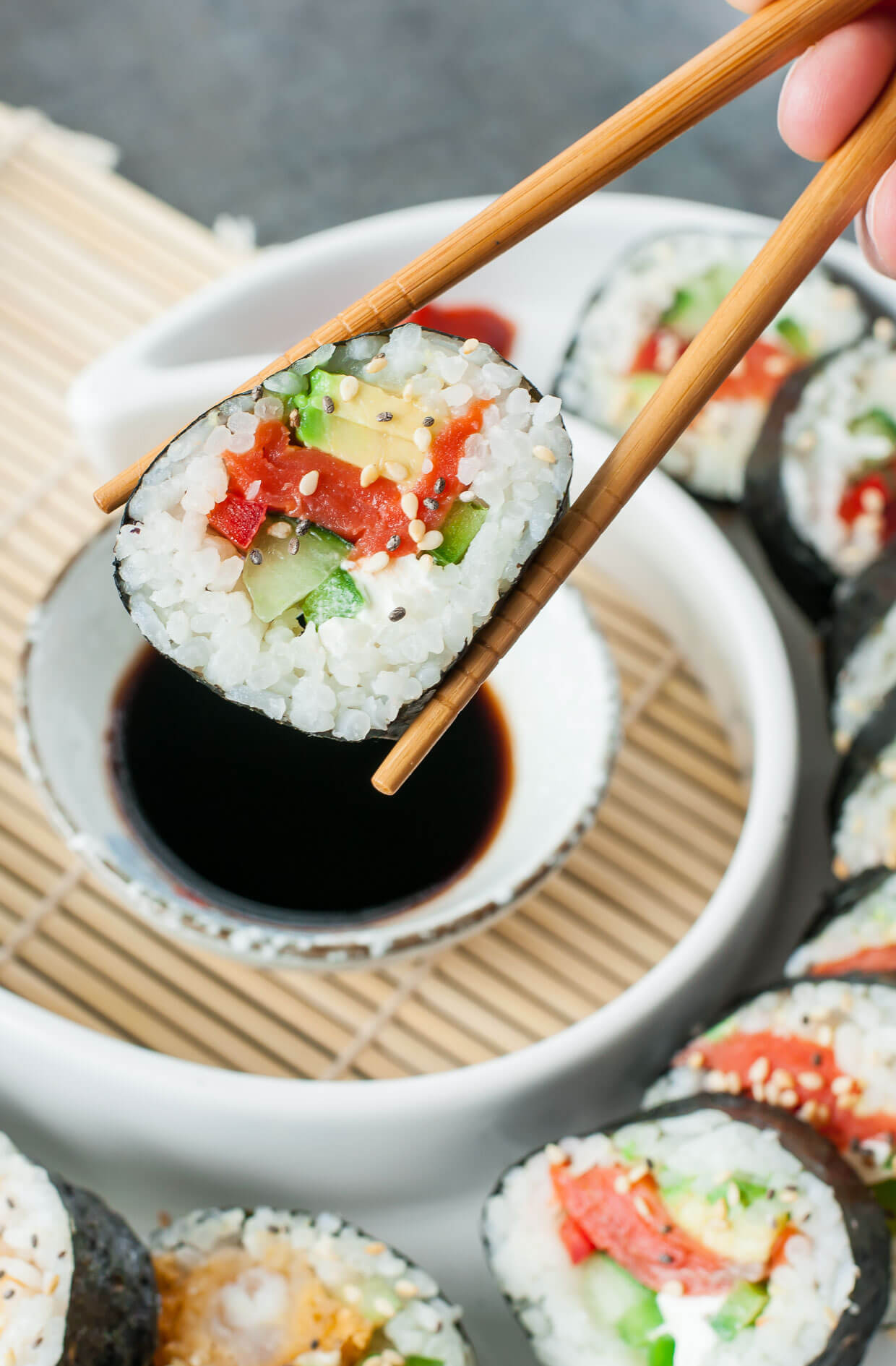Is Sushi Actually Healthy?
Sushi seems like a healthy meal choice at first glance. It contains nutrient-dense fish and rice without heavy sauces or seasonings. However, sushi hides some pitfalls you should know about. Not all sushi gets a clean bill of health. The variations are vast in terms of ingredients and preparation methods.
Let’s explore the good and the bad when it comes to sushi nutrition. With some know-how, you can absolutely make smarter sushi selections.
The Pros of Eating Sushi
In many ways, sushi provides a light, healthy meal packed with lean protein and other vital nutrients. The benefits come primarily from the fish itself and the basic cooking method of sushi.
High in Lean Protein
Fish like tuna, salmon and halibut supply a low-fat, high-quality protein source. Protein keeps you fuller longer while providing the building blocks for muscle growth and development. Many sushi items contain 15-30 grams of protein per order.
Rich in Omega-3s
Oily fish varieties common in sushi are brimming with heart-healthy omega-3 fatty acids. Salmon is an excellent source of the omega-3s EPA and DHA. Other fish provide ALA, another omega-3 form. These healthy fats reduce inflammation and promote brain health.
Low in Calories
With no batter, fillings or heavy sauces, nigiri sushi offers a low-calorie meal. You get lean protein and carbs from just a small portion of rice. Rolls tend to contain more calories but are relatively light compared to fried foods or large entrees.
Nutrient-Dense Ingredients
Many sushi ingredients provide an array of vitamins and minerals. Seaweed wraps offer iodine, magnesium, vitamin K and folate. Avocadoes give you heart-healthy monounsaturated fats. Wasabi brings anti-inflammatory and anti-cancer compounds into the mix.
The Negatives of Eating Sushi
While sushi provides many upsides, the downsides come from some surprising places. Watch out for these not-so-healthy aspects lurking in some sushi dishes.
Mercury Exposure
Certain types of fish used in sushi contain high mercury levels due to industrial pollution. Tuna, mackerel and swordfish should be avoided during pregnancy. For others, limiting intake is wise to prevent mercury toxicity. Excessive mercury causes nerve and brain damage over time.
Refined Carbs in Rice
Rice makes up a significant portion of sushi’s calories. While not necessarily bad, white sushi rice provides little fiber and nutrients compared to whole grains. The refined carbs spike blood sugar quickly and don’t fill you up for long. Choose brown rice over white when available.
Sodium Overload
Sodium seeps into sushi through soy sauce, salted rice vinegar and other ingredients. One dish of sushi can easily contain over 1,000 milligrams of sodium – half of most people’s daily limit. Too much sodium intake raises blood pressure levels.
Potentially Risky Ingredients
Raw fish and shellfish carry a risk of foodborne illnesses like salmonella if not handled and prepared properly. Deep frying (for tempura rolls and other fried sushi) adds excessive fat, calories and potential carcinogenic compounds from high heat cooking oils. Creamy sauces pile on saturated fat and sugar content too.

Tips for Ordering Healthier Sushi
With all these pros and cons in mind, there are simple tricks to maximize sushi’s nutritional advantages:
Go for nigiri, sashimi or hand rolls containing only fish and rice. Avoid tempura, creamy fillings and deep-fried ingredients. Ask if brown rice is available instead of white.
Choose lower mercury fish selections like wild salmon or arctic char. Or limit portions of higher mercury picks like tuna and swordfish.
Request low-sodium soy sauce or use wasabi instead for added flavor.
Load up on veggie-based rolls containing cucumber, avocado and carrots.
Opt for edamame, seaweed salad or miso soup as sides for extra nutrients.
Order individual pieces versus pre-made platters to control portion sizes.
When made with whole, fresh ingredients, sushi absolutely has solid nutritional value. But keep an eye out for sodium bombs, mercury pitfalls and hidden calorie traps found in some sushi variations. With smart ordering, sushi makes a healthy meal for any occasion.
Sushi is a popular Japanese dish that has become a staple in many cultures around the world. It typically consists of bite-sized portions of raw or cooked fish, vegetables, sticky rice, and seaweed, often served with wasabi and soy sauce. While sushi is often perceived as a healthy meal option, its nutritional value depends largely on the ingredients and preparation methods used.
Advantages
1. High in Nutrients: Sushi can be a nutrient-dense meal that includes a variety of vitamins, minerals, and omega-3 fatty acids. Fish such as salmon, tuna, and mackerel are excellent sources of omega-3s, which have been linked to improved heart health, brain function, and reduced inflammation.
2. Low in Fat: Sushi is typically low in fat, making it an ideal meal choice for those watching their calorie intake. The use of lean cuts of fish, such as tuna and salmon, means that sushi is low in saturated fat and high in protein, making it a filling and satisfying meal option.
3. Variety: Sushi offers a wide range of options, allowing diners to customize their meals to suit their preferences and dietary needs. From vegetarian rolls to sashimi platters, there are plenty of options for diners to choose from.
4. Portion Control: Sushi is often served in small, bite-sized portions, making it an excellent option for those looking to control their portion sizes and calorie intake.
While sushi can be a healthy meal option, there are some potential pitfalls to keep in mind. Sushi can be high in sodium, especially if soy sauce is used liberally. Additionally, some sushi rolls can be loaded with mayonnaise and other high-fat sauces, adding unnecessary calories and fat to the meal.

In conclusion, sushi can be a healthy meal option when prepared with fresh, high-quality ingredients and consumed in moderation. Its nutrient density, low-fat content, and variety of options make it an excellent choice for those looking to maintain a healthy diet. However, it is essential to be mindful of the sodium content and the potential for added sauces and fats when ordering sushi. As with any meal, moderation and balance are key to achieving optimal health and well-being.


